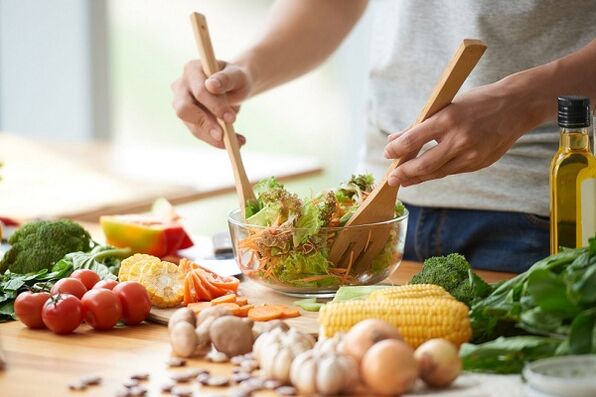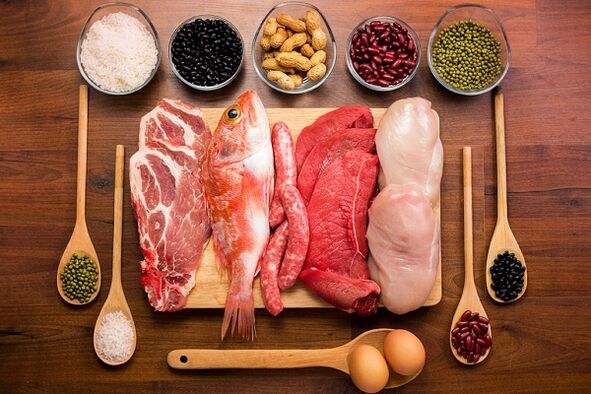Proper nutrition of various diseases is an important element of rapid recovery. A diet for prostatitis and adenoma of the prostate improves the condition of the body, helping men to overcome many of their unpleasant symptoms. Dietary defects, on the contrary, can exacerbate unpleasant symptoms and increase the discomfort caused by prostate disease.
Nutritional characteristics of prostatitis
The main effects of proper eating in prostatitis are:
- Prevents irritation of the pelvic organs, which can aggravate inflammation.
- Strengthening the immune system.
- Normalization of the digestive system.
- Decreased urination, especially at night.
- Prevention of prostate hardening by restoring blood flow and supplying nutrients to the organ.

therapeutic diet includes:
- Enrich your diet with healthy products.
- Design of a drinking system (at least 2-2, 5 liters of filtered water per day).
- A combination of "healthy" food and physical activity (such as physical education).
- Compile separate menus for the "exacerbation" and "remission" phases.
- Total rejection of bad habits.
Useful products
Adequate nutrition for men with prostatitis consists of consuming foods that promote healing. Detailed recommendations are given by a medical specialist.
The following should be added to the diet:
- All kinds of nuts.
- Various dried fruits.
- Lean meat.
- Parsley and other fresh herbs.
- Red fish.
- Vegetables.
- Vegetable fats.
- Non-acidic fruits.
- Gray bread.
- Buckwheat / oatmeal.
- Fermented fried milk, kefir and cottage cheese.
- Fruit compotes.
- Honey.
- Fresh juices (especially asparagus).
- parsnips.
When compiling your daily diet menu, you should pay attention to the amount of fiber consumed. It is important for normal bowel movements (the body excretes faeces from the digestive tract). You should also eat zinc-fortified foods. The trace element increases resistance to infections and improves (and quantitatively) sperm quality.
For stable remission, the following are allowed:
- Mushrooms.
- Spices.
- Some fried food.
- Dry wine (100 ml 1-2 times a month).
Food Contraindications
The following are prohibited for men when diagnosing prostatitis:
- "Fatty" food - increases cholesterol levels, promotes the formation of plaques on the walls of blood vessels. Regular eating "fatty" leads to damage to blood circulation, which makes the course of the disease more difficult.
- Alcohol (even beer) - usually negatively affects a man’s blood flow and health. It leads to congestion in the small pelvis, reduces immunity, disrupts the production of hormones and prostate secretions, and upsets erectile functions.
- Strong coffee - negatively affects the vascular system, increases pressure on the prostate gland, promotes the spread of infection (with bacterial or viral etiology of inflammation) throughout the body.
The following products are also contraindicated:
- Fast food.
- Rich soups.
- By-products.
- Mushrooms.
- Hot peppers, garlic and onions.
- Pickles.
- Spicy food.
- Smoked products.
- Fatty pork and lamb.
- Baking.
- Sour fruits.
- Foods containing chemical additives.
- Carbonated drinks.
- Spices.
- Sweets.
Diet for prostatitis in men: a menu for a week
Diet depends on the stage of prostatitis. The diet for chronic prostatitis can be more varied. The table shows a weekly menu for men in remission.
| Breakfast | Lunch | x> > | |
| Monday | Cabbage and carrot salad; Porridge porridge; Juice. |
Vegetable soup; Boiled beef with vegetable stew; Some fruit. |
Cottage cheese souffle; Fresh apple juice. |
| Tuesday | Cucumber and green salad; Millet porridge; Cherry cooked. |
Shrimp and vegetable soup; Steamed slices with mashed potatoes; Tea with honey. |
Fritters; Berry salad flavored with sour cream. |
| Wednesday | Buckwheat; Cucumbers and tomatoes; Morse. |
Borscht in vegetable soup; Boiled breast; Garlic salad; Green tea. |
Carrot cake; Spoon with sour cream; Kissel from fruits. |
| Thursday | Vinaigrette; Pumpkin seeds and dried apricot cupcake; Herbal decoction. |
Fresh cabbage soup; Boiled rabbit with vegetable garnish; Sweet orange. |
Steamed fish; Celery stew; Apple compote. |
| Friday | Milk soup; Dried bread with cheese; Mint tea. |
chicken soup; Veal stew with fried potatoes; Tomato. |
Pancakes with berries; 2 tablespoons low-fat cottage cheese. |
| Saturday | Corn porridge with dried apricots; Soft eggs; Fresh orange juice. |
Vegetable turkey soup; Steam dumplings; Dried fruit compote. |
potato casserole; Salad leaves with olive oil. |
| Sunday | fried potatoes; Salad with peeled pumpkin seeds; Herbal decoction. |
Cheese soup; Steamed fish with buckwheat; Green or white tea. |
Slices of vegetables; Berry juice. |
Against the background of exacerbation, the diet should be light and gentle. Nutritionists recommend the following option:
- Breakfast. Buckwheat porridge "smear", fruit jelly;
- Lunch. Cabbage soup, boiled fish, beet salad, tea without added sugar;
- Dinner. Steamed chicken dumplings with cooked vegetables and compote;
- For the night. A small portion of homemade yogurt.
The following menu also works:
- Breakfast. Oatmeal with a little honey, cherry jelly;
- Lunch. Tomato liquid soup, light vegetable salad, a slice of cereal bread with low-fat cheese, green tea;
- Dinner. Zucchini steamed with eggs, a slice of cooked fish, fresh;
- Before going to bed. Strawberry juice.
The following diet is suitable for antibiotic therapy:
- In the morning. Cottage cheese casserole with berries and herbal tea;
- Nap. Carrot salad, chicken soup, cooked rabbit with vegetables;
- Evening. Roasted vegetables, bananas and apples;
- For the night. A glass of yogurt.
How to eat properly for BPH?
Benign prostatic hyperplasia (BPH) is expressed in the proliferation of organ tissues. After confirming the diagnosis, the doctor prescribes a special diet in addition to medication. For BPH, the diet is based on several principles:
- Lack of hunger combined with weight correction;
- In the case of obesity, the food is chosen to ensure weight loss;
- Varied menu, foods that contain the necessary trace elements and vitamins;
- Divide the daily food intake into 4-5 meals;
- Avoid food before going to bed.
The main focus is on products that help reduce benign tumors. Any food that increases the load on the bladder and (even indirectly) causes inflammatory processes is excluded.

BPH dietary disorder is fraught with men:
- Constipation or diarrhea.
- Bladder irritation.
- Increased risk of stagnation and blood stagnation in the prostate.
Sometimes, men with a diagnosed prostate adenoma become on a sports diet, considering it the most balanced. It is important to understand that it was developed for healthy people (and that in addition to the main food) and is not intended for use in the presence of abnormal processes in the body.
Nutrition Guidelines for BPH:
- Food should be consumed at about the same time.
- The feeling of overeating should not be allowed.
- The diet is calculated by each person individually.
- The main focus is on foods containing fiber and zinc.
- Eliminate foods that negatively affect the immune system. The
- diet varies depending on whether you are taking medication or surgery.
The diet includes foods useful for BPH:
- Vegetable fats.
- Dietary meat.
- Baked or raw vegetables and fruits. It is especially important to include cucumbers, pears, kiwis, potatoes, watermelons, bananas and dates in the diet.
- Fermented dairy products.
- Pomegranate, carrots, beets, blueberries and tomato juice.
- Shells, fish, algae.
Like prostatitis, drinking is important. About 2, 5 liters of water should be drunk daily.
Experts advise you to reject:
- Fast food.
- Processed and smoked cheeses.
- Milk.
- Store juices and sugary drinks.
- Chili peppers.
- Garlic.
- Sweets.
What do men's opinions say?
You can find comments from men on the Internet about their own experiences with prostatitis and BPH. In addition to information about medications, patients also share the results of the diet in their opinions.
“I have been suffering from prostatitis for over 5 years. I haven't tried anything during this time. And I went to the doctors and did self-healing, it made no sense. For myself, I remarked that while maintaining a proper lifestyle (I’m talking about nutrition now), relapses are much less common and not so “bright”. The key is to exclude alcohol and, if possible, avoid smoking and remove fried, salty and spicy foods in the usual way. "
“Six months ago, I had terrible urination problems. I went to the doctor, he said I had prostatitis. He first warned me that treatment and recovery depend on how I eat and how active I am. There was no sign of inflammation of the prostate. I’m sure the diet has contributed to the lion’s share of the effectiveness of the treatment ”.
“The prostate adenoma crawled unnoticed. The doctor said surgery was not recommended at my age (besides, I have heart problems). He prescribed medications, advised him to walk more in the fresh air and adjust his diet, prescribed what he could eat and what he could not. He strictly forbade the consumption of alcohol. I feel really good, even an erection appeared. The mood improved, I wanted to live with renewed vigor ”.
























